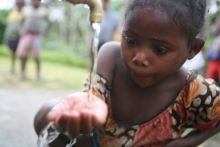Fighting cholera in Kenya

Inadequate concern by the government and its lack of support for partnership and cooperation with trade unions and the communities, reversed the gains earlier made with support from the World Health Organization. The outbreak, which has left at least 14 people dead, has now spread to 12 counties in the country, with Nairobi as its epicentre. Cases including fatalities are being reported in the general population as well as in refugee camps, with the Dadaab camps which host 245,126 refugees being mostly affected.
Cholera is an acute diarrhoeal disease which can kill within hours if left untreated. Kenya has a history of annual epidemics, which peak in intensity approximately every five years. Cholera is associated with impoverishment of the population and a consequent generalisation of adverse social-economic determinants of health.
Poor access to potable water, poor sanitation and crowded living spaces have negatively influenced the recurrent occurrence of cholera in the country. Denial, poor preparedness and a lack of a medical emergency response strategy might have contributed to the death of several people who contracted cholera in this alarmingly prevalent outbreak.
The high incidence rate is also accompanied by heightened fears about antibiotic resistance. A recent study in the country shows that the vibrio cholera bacteria that causes cholera has become resistant to some antibiotics needed to treat the disease effectively. While there is evidence that it can still be adequately treated with the drug doxycycline, prevention and crisis preparedness need urgent attention by the Kenyan government to break the vicious cycle of cholera epidemics in the country.
This requires a multi-sectoral approach based on a Health in All Policies framework. Whilst the promotion of general hygiene for example is important, crowded and substandard housing remain potential nesting ground for the cholera bacteria. According to the WHO factsheet there are 1.3 to 4.0 million cases of cholera, and 21 000 to 143 000 deaths worldwide per year due to cholera. Provision of access to clean water for all, decent housing and sanitation would allow a drastic reduction in these numbers.
In Kenya, 37% of the population still rely on unimproved water sources, such as ponds, shallow wells and rivers, while 70 percent use unimproved sanitation solutions. There is urgent need for far-reaching public investments in these social determinants for cholera outbreaks in particular to be curbed and to safeguard the right of poor Kenyans to good health.
The government equally needs to encourage a spirit of partnership and cooperation with the health workforce, which is critical to public health interventions for ending the outbreak. It has until now held health workers in disdain, repeatedly reneging on collective agreements while dismissing workers’industrial actions over rights disputes, themselves a consequence of government contempt for social dialogue.
The government’s scorn for social dialogue was already visible in its disposition to medical doctors during the 100-day strike for upholding a 2013 collective agreement at the beginning of the year. A similar situation is playing out regarding the ongoing general strike of the Kenyan National Union of Nurses, over a rights dispute. But stamping out cholera in Kenya and achieving the goal of universal healthcare needs action from all parties, in a climate of mutual respect and sincerity entrenched in the processes and mechanisms of social dialogue.

